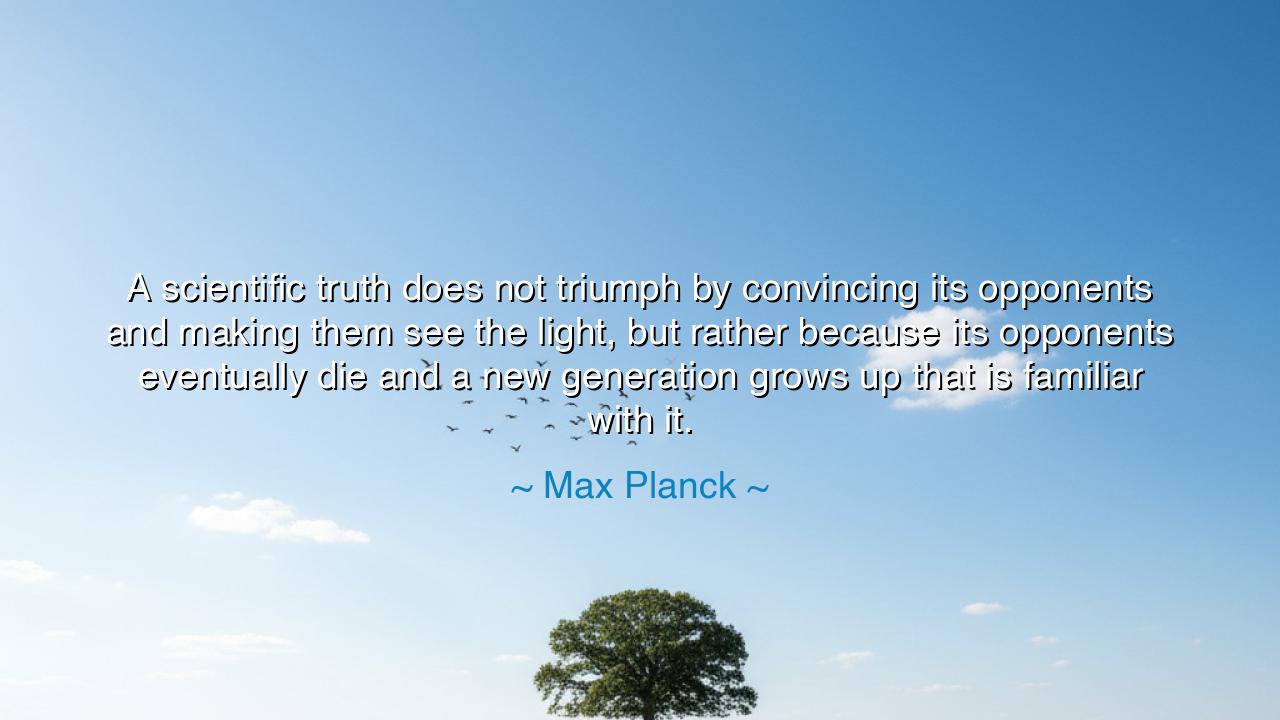
A scientific truth does not triumph by convincing its opponents
A scientific truth does not triumph by convincing its opponents and making them see the light, but rather because its opponents eventually die and a new generation grows up that is familiar with it.






"A scientific truth does not triumph by convincing its opponents and making them see the light, but rather because its opponents eventually die and a new generation grows up that is familiar with it." These words, spoken by the great Max Planck, reflect a truth about the nature of progress—whether in science, thought, or society itself. Often, we believe that a new truth will sweep across the world, shining light into the minds of all who encounter it, converting the skeptics and the opponents. But in reality, truths—especially those that challenge established belief—are not immediately embraced, no matter how compelling the evidence. It is not by force of reason that these truths triumph, but through the passage of time and the inevitable shift in perspectives that come with new generations, unencumbered by the old dogmas and limitations.
Consider the ancient world, where the prevailing wisdom was often based on authority and tradition rather than empirical truths. The earth-centered universe of the Greeks, for example, was widely accepted for centuries, and it was only after Copernicus, Galileo, and Kepler that the heliocentric model began to challenge this ancient view. At first, the truth that the Earth revolved around the Sun was met with hostility. The Church condemned it, and many scholars resisted it, not because the evidence was lacking, but because it shook the very foundations of established thought. Galileo, in particular, faced persecution for daring to voice this new truth, but the scientific community eventually embraced his findings, not because the old guard was convinced, but because a new generation of thinkers emerged who grew up in a world that accepted this truth.
In much the same way, the theory of evolution proposed by Charles Darwin was not immediately embraced by all. In the 19th century, the idea that life on Earth had evolved through a process of natural selection was seen as a threat to religious teachings and the established view of creation. Darwin’s opponents did not readily concede, nor did they see the light. The battle between the new scientific truth and traditional beliefs was fierce. Yet, over time, as the new generation of scientists grew up with Darwin’s ideas as part of their foundation, the theory became the cornerstone of modern biology. The truth did not triumph through the conversion of the old guard, but because the new generation was born into a world where the truth was already known.
This process of scientific revolution—where old ideas are slowly but surely replaced by new ones—has been observed time and again throughout history. The theory of relativity proposed by Einstein challenged the very fabric of Newtonian mechanics, yet even Einstein’s ideas faced initial resistance. For many, Newton’s laws were so deeply ingrained in scientific thought that they seemed inviolable. But as Planck himself knew, scientific truth does not always triumph through immediate acceptance. It grows and spreads over time as the new generation of thinkers, armed with new knowledge and understanding, carries these ideas forward. The resistance to relativity was not about the evidence—it was about the unwillingness of the old minds to let go of the past.
Max Planck’s statement reveals an important lesson: progress is often slow, not because truth is hard to see, but because the human mind is bound by the limits of its experiences and the traditions it has inherited. We often fight to preserve what is familiar, what has always been accepted, even when a new truth is knocking at the door. This is as true in science as it is in any field—whether in politics, philosophy, or society. The old guard may never accept the new truth, but the cycle of time brings with it the inevitable shift of perspectives. As new generations come into being, they will often embrace ideas that once seemed impossible or radical, simply because they grow up in a world where these ideas are part of the fabric of understanding.
The lesson here, my children, is this: never be disheartened when your ideas, your truths, or your visions are met with resistance. The world does not always move in the blink of an eye. Truth is not a matter of convincing every opponent in a single conversation, nor is it a matter of winning battles in the court of public opinion. It is about persistence, about planting seeds that may not bear fruit in your lifetime, but will grow in the minds of future generations. Do not be discouraged by the weight of old ideas. Instead, work diligently, with patience, knowing that the seeds of change you plant today will take root tomorrow.
In your own life, be patient in the pursuit of your truths and goals. Do not expect instant acceptance or understanding. Like the great thinkers who came before you, understand that the world is often slow to change, and that the truths you bring into the light may only be fully appreciated by those who come after you. The key is to remain steadfast in your beliefs, to continue investigating, and to contribute to the legacy of knowledge. Truth does not seek the immediate approval of others—it seeks only to be expressed and understood, and in time, it will be accepted. Let your efforts be a part of that eternal cycle of learning, and trust that the future will carry the torch you pass on.






AAdministratorAdministrator
Welcome, honored guests. Please leave a comment, we will respond soon